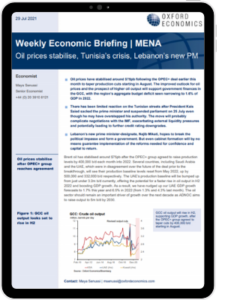MENA | Oil prices stabilise, Tunisia’s crisis, Lebanon’s new PM

Oil prices have stabilised around $75pb following the OPEC+ deal earlier this
month to taper production cuts starting in August. The improved outlook for oil prices and the prospect of higher oil output will support government finances in the GCC, with the region’s aggregate budget deficit seen narrowing to 1.6% of GDP in 2022.
What you will learn from this report:
- There has been limited reaction on the Tunisian streets after President Kais Saied sacked the prime minister and suspended parliament on 25 July even though he may have overstepped his authority.
- The move will probably complicate negotiations with the IMF, exacerbating external liquidity pressures and potentially leading to further credit rating downgrades.
- Lebanon’s new prime minister-designate, Najib Mikati, hopes to break the political impasse and form a government. But even cabinet formation will by no means guarantee implementation of the reforms needed for confidence and capital to return.
Tags:
Related Services

Post
UK: Supply constraints are probably less prominent in the south
The extent to which UK employers can respond to likely 2024 interest rate cuts with increased output, rather than rises in prices and wages, will partly reflect the extent of spare capacity. This will inevitably vary by region. Evidence on this is imperfect, but in terms of capital assets (including intangibles) and labour availability, southern regions appear to be in a stronger position than those in the UK's traditional industrial heartland.
Find Out More
Post
Global Private equity real estate fund maturities spur asset sales
We expect the significant increases in fund maturities, spurred by capital raised over the past decade, to exert upward pressure on the rate of asset disposals as the funds approach the end of their lifecycles.
Find Out More